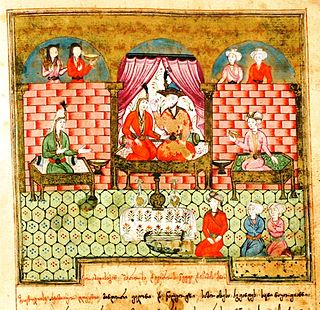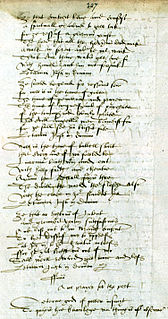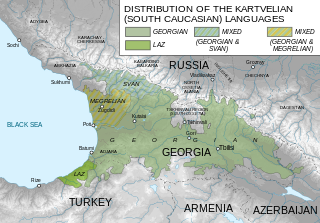
Lyric poetry is a formal type of poetry which expresses personal emotions or feelings, typically spoken in the first person. The term derives from a form of Ancient Greek literature, the lyric, which was defined by its musical accompaniment, usually on a stringed instrument known as a lyre. The term owes its importance in literary theory to the division developed by Aristotle between three broad categories of poetry: lyrical, dramatic, and epic.

The Knight in the Panther's Skin is a Georgian medieval epic poem, written in the 12th century by Georgia's national poet Shota Rustaveli. A definitive work of the Georgian Golden Age, the poem consists of over 1600 Rustavelian Quatrains and is considered to be a "masterpiece of the Georgian literature". Until the early 20th century, a copy of this poem was part of the dowry of any bride.

Shota Rustaveli, mononymously known simply as Rustaveli, was a medieval Georgian poet. He is considered to be the preeminent poet of the Georgian Golden Age and one of the greatest contributors to Georgian literature. Rustaveli is the author of The Knight in the Panther's Skin, which is considered to be a Georgian national epic poem.

Persian literature comprises oral compositions and written texts in the Persian language and it is one of the world's oldest literatures. It spans over two-and-a-half millennia. Its sources have been within Greater Iran including present-day Iran, Iraq, Afghanistan, the Caucasus, and Turkey, regions of Central Asia and South Asia where the Persian language has historically been either the native or official language. For instance, Rumi, one of best-loved Persian poets born in Balkh or Vakhsh, wrote in Persian and lived in Konya, then the capital of the Seljuks in Anatolia. The Ghaznavids conquered large territories in Central and South Asia and adopted Persian as their court language. There is thus Persian literature from Iran, Mesopotamia, Azerbaijan, the wider Caucasus, Turkey, western parts of Pakistan, India, Tajikistan and other parts of Central Asia. Not all Persian literature is written in Persian, as some consider works written by ethnic Persians in other languages, such as Greek and Arabic, to be included. At the same time, not all literature written in Persian is written by ethnic Persians or Iranians, as Turkic, Caucasian, and Indic poets and writers have also used the Persian language in the environment of Persianate cultures.
Douglas Valentine LePan, OC, FRSC was a Canadian diplomat, poet, novelist and professor of literature.
-- Lines 9–16, "Pikes Peak", the original name of Katharine Lee Bates' poem, first published on July 4 and later set to music and known as "America the Beautiful"
Nationality words link to articles with information on the nation's poetry or literature.

Besarion Zakarias dze Gabashvili, commonly known by his pen name Besiki, was a Georgian poet, politician and diplomat, known as an author of exquisite love songs and heroic odes as well as for his political and amorous adventures.

Prince Grigol Orbeliani or Jambakur-Orbeliani was a Georgian Romanticist poet and general in Imperial Russian service. One of the most colorful figures in the 19th-century Georgian culture, Orbeliani is noted for his patriotic poetry, lamenting Georgia's lost past and independent monarchy. At the same time, he spent decades in the Russian military service, rising through ranks to highest positions in the imperial administration in the Caucasus.

Visramiani is a medieval Georgian version of the old Iranian love story Vīs and Rāmīn, traditionally taken to have been rendered in prose by Sargis of T'mogvi, a 12th/13th-century statesman and writer active during the reign of Queen Tamar.
Ioane Shavteli was a Georgian poet of the late 12th and early 13th centuries credited to have written the encomiastic poem traditionally, and unsuitably, known as Abdulmesiani (აბდულმესიანი), i.e., "Slave of the Messiah".
Nationality words link to articles with information on the nation's poetry or literature.
Zakaria II Mkhargrdzeli or Zakare Zakarian was a Georgian–Armenian noble and one of the generals of Queen Tamar of Georgia army during the late 12th and early 13th centuries. He was the ruler of feudal lands in the Kingdom of Georgia.

Literature in early modern Scotland is literature written in Scotland or by Scottish writers between the Renaissance in the early sixteenth century and the beginnings of the Enlightenment and Industrial Revolution in mid-eighteenth century. By the beginning of this era Gaelic had been in geographical decline for three centuries and had begun to be a second class language, confined to the Highlands and Islands, but the tradition of Classic Gaelic Poetry survived. Middle Scots became the language of both the nobility and the majority population. The establishment of a printing press in 1507 made it easier to disseminate Scottish literature and was probably aimed at bolstering Scottish national identity.

Poetry of Scotland includes all forms of verse written in Brythonic, Latin, Scottish Gaelic, Scots, French, English and Esperanto and any language in which poetry has been written within the boundaries of modern Scotland, or by Scottish people.

Scots-language literature is literature, including poetry, prose and drama, written in the Scots language in its many forms and derivatives. Middle Scots became the dominant language of Scotland in the late Middle Ages. The first surviving major text in Scots literature is John Barbour's Brus (1375). Some ballads may date back to the thirteenth century, but were not recorded until the eighteenth century. In the early fifteenth century Scots historical works included Andrew of Wyntoun's verse Orygynale Cronykil of Scotland and Blind Harry's The Wallace. Much Middle Scots literature was produced by makars, poets with links to the royal court, which included James I, who wrote the extended poem The Kingis Quair. Writers such as William Dunbar, Robert Henryson, Walter Kennedy and Gavin Douglas have been seen as creating a golden age in Scottish poetry. In the late fifteenth century, Scots prose also began to develop as a genre. The first complete surviving work is John Ireland's The Meroure of Wyssdome (1490). There were also prose translations of French books of chivalry that survive from the 1450s. The landmark work in the reign of James IV was Gavin Douglas's version of Virgil's Aeneid.
Amanelisdze were a noble family in medieval Georgia with a surge in prominence in the 12th and 13th centuries.

The Georgian Golden Age describes a historical period in the High Middle Ages, spanning from roughly the late 11th to 13th centuries, during which the Kingdom of Georgia reached the peak of its power and development. In addition to military expansion, this period saw the flourishing of medieval Georgian architecture, painting and poetry, which was frequently expressed in the development of ecclesiastic art, as well as the creation of first major works of secular literature.

Georgian Shirvan refers to a period between 1124 and 1239 when Shirvan came under the Georgian political dominance and since then the Shirvanshahs became the protectorate of the Kingdom of Georgia, as the result of David IV of Georgia's gradual expansions against the Seljuk Turks. Until the Mongol invasion and subjugation of Georgia by resurgent Mongol Empire in 1239, Georgian kings officially bore the title of Shirvanshahs, and sporadically assumed this title down to sixteenth century.














